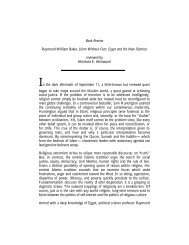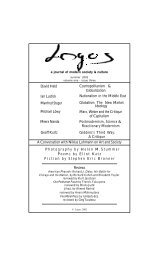Michael J. Thompson Stephen Eric Bronner Wadood Hamad - Logos
Michael J. Thompson Stephen Eric Bronner Wadood Hamad - Logos
Michael J. Thompson Stephen Eric Bronner Wadood Hamad - Logos
Create successful ePaper yourself
Turn your PDF publications into a flip-book with our unique Google optimized e-Paper software.
Stanley Aronowitz<br />
the ideological baggage of the past, especially Marxist orthodoxy and<br />
Stalinism.<br />
Like Jean-Paul Sartre, whose Critique of Dialectical Reason appeared in 1960,<br />
he came to regard tradition, even radical tradition, as a political albatross. He<br />
never used Sartre’s fancy term “practico-inert” to mark the encrusted habits<br />
that induce people to reproduce the past in the present but he was a persistent<br />
critic of the habituation of the left to old ideas. A withering opponent of the<br />
Communists, sensing the impending doom of the Soviet Union after the<br />
opening provided by the Khruschev’s revelations of Stalin’s crimes at the 20th<br />
Communist Party Congress in 1956, he was among the first to urge the young<br />
to disdain their elders’ preoccupation with the “Russian” question and instead<br />
attend with fresh eyes and hearts to the tasks at hand: to oppose U.S.<br />
intervention in the affairs of revolutionary societies and to establish the<br />
framework for a radical democratic society.<br />
I have no doubt he was right to urge the young radicals to distance themselves<br />
from the past, at least in the short or intermediate term. But he never made<br />
clear that he himself had been reared, politically, on the Russian question and<br />
forgot that those who ignore addressing the failure of the revolution were<br />
doomed to relive it, an eventuality he was never cursed to witness. That the<br />
New Left, which soon captured the imagination of an entire generation, went<br />
awry may not be attributed exclusively to its refusal to address really existing<br />
socialisms of the Stalinist variety. But, it was entirely disarmed when, in the<br />
wake of the heating up of the war in southeast Asia, various Marxist ideologies<br />
became matters of urgent debate; most young leftists found themselves<br />
overwhelmed. They were moved by guilt as much as ignorance to confer<br />
uncritical support to the Vietnamese communists and even hailed the efforts of<br />
Pol Pot in Cambodia. By 1970, many reared the New Left were no longer<br />
Mills’ spiritual children; they all but renounced his democratic faith in favor of<br />
a “third world” dogma of national liberation at all costs. But, ironically, Mills<br />
himself was not immune from such enthusiasms.<br />
The book-length pamphlets were received as more than controversial, not only<br />
because they were, in many minds, notoriously heretical for their tacit<br />
violation of academic insularity, but also because they broke from the main<br />
tenets of the Cold War anti-Communist consensus at a time when, under<br />
<strong>Logos</strong> 2.3 – Summer 2003




